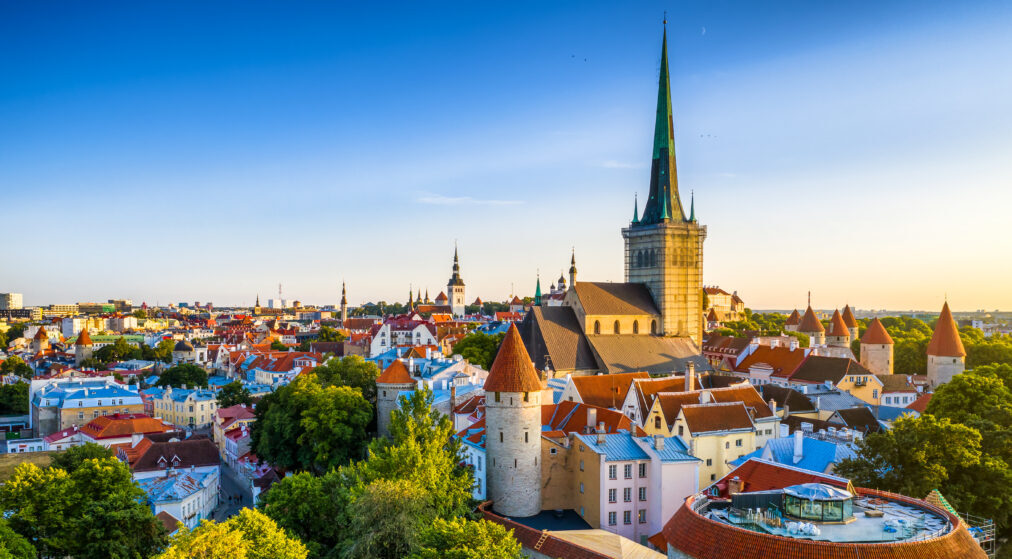Continuing with our series exploring innovative tech hubs worldwide, we take a look at the state of play in the Tallinn, Estonia tech scene
Are you ready for your next tech adventure? Do you want to move to an eco-friendly city with a booming tech scene, fabulous nightlife, and impressive transport links? Well, maybe it’s time you considered Tallinn, known as the Gem of the Baltic.
Estonia’s tech scene has been making a name for itself over the last number of years. In fact, according to reports earlier this year, Estonia’s technology sector is worth twice its national budget.
Estonia’s 25 most valuable technology companies are worth a combined €21bn. For comparison, the national budget for 2021 was €13bn. That’s a pretty impressive statistic. But why is Tallinn emerging as such a tech hotspot?
The city’s success can be summarised under three key pillars: government support; top talent; and large investment.
The Estonian government has, for a long time, championioned technology companies in the region. The country has dedicated funds to help build and bring together local startup communities. The government has also developed regulatory frameworks to help startups to get up and running or raise funding.
Another big player in Estonia’s success is its people. Estonian education is one of the best in the world, according to the OECD. The country is relatively small with just 440,000 people living in Tallinn, but what it lacks in size, it more than makes up for in quality.
The share of Estonians working in the tech industry has been growing every year, and now accounts for close to 6 per cent of the entire workforce in 2022, thanks to major international companies including Ericsson, Fujitsu, and Microsoft.
Finally, Estonia — and Tallinn in particular — has a long tradition of attracting investors and connecting them with startups and more established companies. Founders are also not tasked with raising the entire amount needed ahead of founding an enterprise.
While these three pillars are great for companies, why should tech professionals consider moving to Tallinn? Firstly, there are plenty of job opportunities at multinational companies and homegrown unicorns such as Skype, Playtech, and Wise.
As a member of the EU, Europeans can easily work here. For countries outside of the EU, visas and permits can be obtained and language shouldn’t be a barrier: many jobs don’t require you to speak Estonian.
The cost of living in Tallinn is very reasonable, and accommodation isn’t hard to come by, unlike other European capital cities. Plus, once you’re a resident, you can use public transport for free!
While the winters are cold, you’ve got great access to the rest of Europe and beyond if you want to escape the chill.
Now, let’s take a look at the main sectors that you could work in.
Electronics
Manufacturing of electronic and electrical equipment is one of the fastest-growing industries in Estonia, according to the International Trade Administration.
The industry benefited from the shortening of supply chains during the pandemic, which led to many manufacturing activities returning to Europe from Asia. Is it estimated that the Estonian electronics sector has an annual turnover of about €12 million.
A key electronics company in Tallinn is ABB. A multinational corporation headquartered in Zürich, ABB has three different locations in Tallinn for various parts of its business.
According to its website, ABB “contributes to the transformation of society and industry with its electrification, automation, robotics and motion solutions”. By joining its team, you will have the opportunity to make a difference, expand your horizons, and grow in your professional career.
Telecommunications
Telecommunications is a growing sector, and the country is dedicated to increased connectivity so much so that there is a dedicated agenda. The Estonian Digital Agenda 2030 focuses on developing digital public services, cyber security, and improving connectivity nationally.
One company that is leading the charge in this regard is Ericsson. Telefonaktiebolaget LM Ericsson (that’s Ericsson to you and me) is a Swedish multinational networking and telecommunications company, headquartered in Stockholm.
Ericsson made headlines in Estonia in 2020 when it announced that it was partnering with Telia to switch on Estonia’s first commercial 5G network. Ericsson also plans to start manufacturing radio communication systems, with a plant for radio communication devices located in Tallinn.
>See also: How the Government of Estonia is placing AI at the heart of operations
ICT
The ICT sector has been the most important aspect of Estonia’s economic growth over the last decade. According to reports, the ICT sector has brought in a huge 30 per cent in added value to the total economy. There were more than 6,000 companies operating in the ICT sector in 2019.
Fujitsu is a Japanese multinational information and communications technology equipment and services corporation, headquartered in Tokyo. However, the company has been operating here since 1991, and is now one of the leading IT services companies in Estonia, with 340 employees and growing.
As a family-friendly company, Fujitsu offers employees lots of flexibility. They also heavily promote lifelong learning. And, untraditionally for an IT company, it has more women (60 per cent) than men (40 per cent).
Explore jobs all around the world on the Information Age Job Board today.
Pippa Hardy is a content creator and writer for Amply by Jobbio. She’s a work-from-home enthusiast who loves all things travel and tech. When she’s not writing up her next article, she’s usually hiking or spending a whole afternoon on Pinterest.
Related:
A guide to working in the Nicosia tech scene — Taking a look at what Cyprus’s capital city brings to the global tech talent pool.
A guide to working in the Eindhoven tech scene — Exploring what the tech scene in Eindhoven, The Netherlands has to offer.







